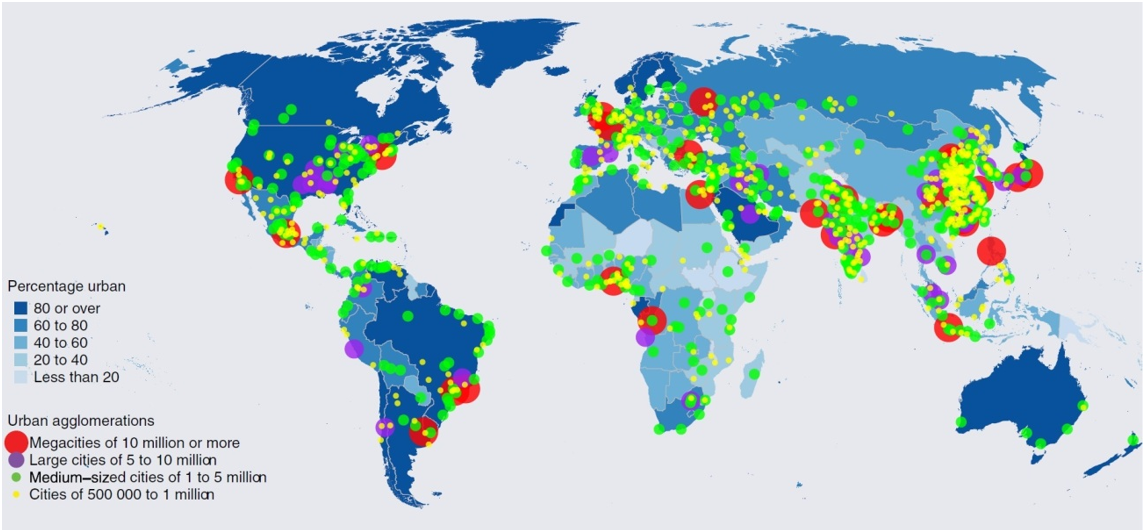The future is urban. Of course that is a wildly generalised comment to start with, however broadly speaking it is true. From the 1950s where 2/3 of the world’s population lived in rural settings, we are moving into a future where the inverse is the norm. This brings both challenges around public health, environmental impacts and the undermining of rural communities; and opportunities around economy of scale, innovation and the economic growth which cities can drive.

Percentage urban and location of urban agglomerations with at least 500,000 inhabitants, 2014. Source: UN | World Urbanization Prospects: The 2014 Revision, Highlights
I’ve always been fascinated by cities – their energy, their noise, their opportunities capture my imagination. Initially I found myself most attracted to bigger cities – London, New York, Berlin – whose size offered a feeling of limitless potential. More recently, however, I’ve found that it is the smaller post-industrial cities which most capture my attention – cities like Pittsburgh in the US, Tampere in Finland and my own city of Glasgow in Scotland.
Over the last two years I have been working closely with the cities of Glasgow and Pittsburgh to explore and develop opportunities for collaboration and work. Post-industrial cities offer incredible insights into the opportunities and challenges I mentioned at the beginning of this article. As covered by the Pittsburgh academic Don Carter in his recent speech at the RSA, many of these cities have been through incredibly turbulent evolutions, marked across the board by periods of economic success in the inter and post-war years (although definitely not inclusive in how the success was shared, and with significant negative environmental impacts) which were then followed by traumatic economic downturns and loss of population as key industries died out. For Pittsburgh it was the decline of steel; Glasgow the closing of the shipyards – monumental events with huge cost for the people of the city and indeed the city’s place in the world.
What has been fascinating to watch is how many of these cities are now bouncing back. Pittsburgh is consistently rated as being one of the best cities to live in, while Glasgow was named by the New York Times as one of the top places in the world to visit in 2018 – a start contrast to their industrial past. Likewise other post-industrial cities such as New Orleans, Liverpool and Bilbao have reinvented themselves from periods of loss and difficulty. This rejuvenation brings with it benefits around innovation, investment and the health of the population, creating space for new narratives to be constructed on top of the proud histories which preceded them.
In working with colleagues in Pittsburgh, I’ve fallen in love with the way that the city has managed to create a vision for a bright new future based on skills, knowledge and new technologies such as Artificial Intelligence, whilst retaining the gritty culture and blue-collar ethos which the city is built upon. At the recent Future of Work conference that we organised in Pittsburgh between RSA US and the Energy Innovation Centre, it was inspiring to hear how this vision is being developed and delivered, with core components around partnering the public, private and voluntary sectors; creating a clear and consistent strategy, which is open to iterative change (similar to the theory of change we utilise at the RSA); and possibly most crucially to be understood as a process which takes, and requires, time and patience.
This is not to say that all is perfect in Pittsburgh – as my colleague Adanna explored in her recent blog, huge structural barriers remain that prevent some of the city’s citizens from benefiting fully from its economic progress. Likewise, for cities to be the drivers of inclusive growth that we want and need them to be, they need to have a positive impact on the regions and areas that surround them. Pittsburgh has bounced back impressively from its darkest days, but many of the surrounding towns of Pennsylvania are still awaiting their own renaissance.
Despite these challenges, I believe that Pittsburgh is an ideal space for us to learn and work. For an organisation like the RSA, rooted in Enlightenment principles and finding new ways to bring them into fruition in the 21st Century, the city is one which sits nicely with our own ethos. As my family and colleagues will testify, I have become an evangelist for Pittsburgh and the relationship with my own city of Glasgow – watch this space as our post-industrial cities continue to be thriving examples of place-based innovation in the coming years.
Jamie Cooke is Head of RSA Scotland, with a particular interest in basic income, inclusive growth and the role of cities in the future economy. Connect with him on Twitter @JamieACooke or [email protected]

Be the first to write a comment
Comments
Please login to post a comment or reply
Don't have an account? Click here to register.